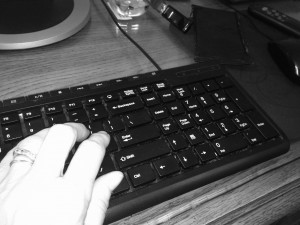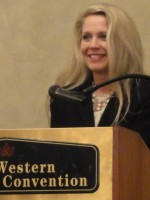 Our country’s workplace has changed a lot. The day of getting a job right out of school and staying there for four decades is long gone. www.balance.com reports that the 21st century worker will have to switch jobs at least a dozen times during their career. All this change has resulted in some individuals becoming increasingly fearful of what tomorrow will bring. Fear is a formidable foe that can cause us get out of balance in our daily lives.
Our country’s workplace has changed a lot. The day of getting a job right out of school and staying there for four decades is long gone. www.balance.com reports that the 21st century worker will have to switch jobs at least a dozen times during their career. All this change has resulted in some individuals becoming increasingly fearful of what tomorrow will bring. Fear is a formidable foe that can cause us get out of balance in our daily lives.
Long ago, the fear of failure or possible lack was the catalyst for my becoming trapped in the proverbial “rat on the treadmill” syndrome, better known as workaholism. Psychotherapist, Bryan E. Robinson, defines workaholism as “an obsessive-compulsive disorder that manifests itself through self-imposed demands, an inability to regulate work habits, and an overindulgence in work to the exclusion of most other life activities.”
Our culture gives pats on the back to those willing to devote their entire existence to their career. Whether you are employed as a six figure executive or struggling single mom like I was, people-pleasers share the commonality of saying, “yes” when we really want to say “no.” Your health can suffer, along with your family and personal relationships. It can be an especially difficult balancing act for working moms, unlike the storybook family photos on Facebook, Pinterest, or Instagram. According to the Barna Group’s FRAMES project, 76% of women in our nation reported to overall satisfaction in their lives, but this data is a lot like posed social media pictures.
When Barna researchers unpacked the 2013 survey, the reality is that 62% of moms with children in their household are “dissatisfied with their balance between work and home life…Eight in 10 moms (80%) feel overwhelmed by stress…and seven out of 10 (70%) say they do not get enough rest…”
National best-selling author and speaker, Lysa TerKeurst believes that we should learn to say, “No.” In her 2014 book, The Best Yes: Making Wise Decisions in the Midst of Endless Demands, she writes, “I misuse the two most powerful words, yes and no. I slap purpose across the face and stomp calling into the ground as I blindly live at the mercy of the requests of others that come my way each day.” I read TerKeurst’s book last year. I wish I could have read it fifteen years sooner, before I fell flat on my face from physical exhaustion and burn out, and couldn’t work for months.
Approximately 10 percent of American adults can be classified as workaholics according to Steven Sussman who is a professor of preventive medicine and psychology at the University of Southern California. Unfortunately, there’s a modern version of workaholism, that of being an “office martyr” which significantly affects millennials. That’s right, millennials, the group of individuals born in 1981 or later who are often accused of wanting to have a workplace voice without paying their dues. Looks like society might have pegged some of these young workers incorrectly.
 According to Project: Time Off, http://www.projecttimeoff.com/about-us, “Millennial workers are the most likely generation to forfeit time off, even though they earn the least amount of vacation days. Millennials stay at work because they feel more fear and greater guilt about taking time away from the office than any other generation.” Society is concerned about this newest endangered demographic, but not for the right reasons. Instead of being worried about their prematurely high blood pressure, anxiety, depression, or work-related weight gain, the travel industry is concerned that as millennials forfeit vacation days the result is billions of dollars of lost revenue according to a June 2016 Washington Post article by Robert Samuelson.
According to Project: Time Off, http://www.projecttimeoff.com/about-us, “Millennial workers are the most likely generation to forfeit time off, even though they earn the least amount of vacation days. Millennials stay at work because they feel more fear and greater guilt about taking time away from the office than any other generation.” Society is concerned about this newest endangered demographic, but not for the right reasons. Instead of being worried about their prematurely high blood pressure, anxiety, depression, or work-related weight gain, the travel industry is concerned that as millennials forfeit vacation days the result is billions of dollars of lost revenue according to a June 2016 Washington Post article by Robert Samuelson.
Still, a vacation can be a good thing. A post on www.bustle.com by Carolyn Steber points to the benefits of time off including: reduced anxiety, increased productivity, better work/life balance, rekindling relationships, and resetting your focus. Some advice gleaned from my own workaholic journey is that if you’re used to always saying “yes,” you might have to say “no,” to everything that’s not a mandatory work assignment, until you reestablish your priorities. If you’re a people-pleaser like me, pause to consider the consequences before committing to a task whenever professionally possible. Also, it’s extremely valuable to be accountable to someone who cares about you. In the end, time is a precious gift, let’s use it wisely.
 Christina Ryan Claypool is an author and an inspirational speaker. Contact her through her website at www.christinaryanclaypool.com.
Christina Ryan Claypool is an author and an inspirational speaker. Contact her through her website at www.christinaryanclaypool.com.

 Social media can be a lot like a family gathering gone wrong when a meltdown in communication occurs. Yet, like many people, I enjoy the ability to connect and share information, especially on Facebook. But then I am a Baby Boomer.
Social media can be a lot like a family gathering gone wrong when a meltdown in communication occurs. Yet, like many people, I enjoy the ability to connect and share information, especially on Facebook. But then I am a Baby Boomer. Christina Ryan Claypool is an AP/Amy Award winning freelance journalist and former interpersonal communications instructor for Mount Vernon Nazarene University. Contact her through her Website at
Christina Ryan Claypool is an AP/Amy Award winning freelance journalist and former interpersonal communications instructor for Mount Vernon Nazarene University. Contact her through her Website at